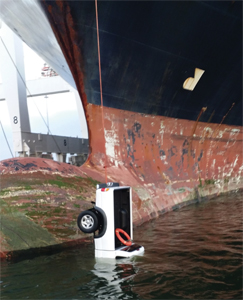The U.S. Coast Guard is urging port workers to exercise caution and avoid risks when handling mooring lines after a “near-miss” in Baltimore last year that left a pickup truck dangling from the bow of a ship.
The agency issued a safety alert in November based on the March 21, 2015, incident at the Seagirt Marine Terminals. In that situation, a mooring line messenger from the 984-foot MSC Ilona was still attached to the Toyota pickup’s towing hitch when the ship’s winch started hauling in the line. (PM #193, August 2015)
The driver escaped with minor injuries before the vehicle was pulled off the terminal. But the truck was left dangling half-submerged until the next day.
The safety alert acknowledges line handlers routinely use trucks, golf carts and other equipment to assist with large mooring lines that often can be extremely heavy. The Coast Guard urges port facilities and workers who handle these lines to develop procedures and practices to avoid a similar incident.
“It is also recommended that vessel operators and deck officers use caution and remain vigilant of all components when hauling in, ensuring that lines and cables are clear and free of attachments,” the alert said. “Special attention should be given to the mooring lines as they are coming off the dock and being hauled aboard.”
The alert suggested using quick-release or weak-link devices for an extra safety layer. It recommended ensuring that line handlers and ship crew be able to communicate during the berthing and unberthing process.
Lt. Cmdr. Matt Meskun, chief of inspections for Coast Guard Sector San Juan, pursued the safety alert after learning about the Baltimore incident from a friend who lives there. Typically this type of incident would not merit extensive Coast Guard attention. However, he chose to pursue the safety alert to highlight potential dangers during this otherwise common practice.
“Because there were no significant injuries (in the Baltimore incident), this resulted in what you could say is a near-miss,” Meskun said in a recent interview. “There is no regulatory requirement industry to report near-misses to us.”
“The whole purpose of our Coast Guard investigative program is really to prevent reoccurrence,” he added.
The Maryland Port Authority, which owns the terminal, conducted an after-action safety meeting with Maryland Line Handling, whose employees were involved in the incident. Richard Scher, a port authority spokesman, said the meeting included a discussion on safety protocols.
“Those practices are being followed but it is up to the employer (to) develop, train and audit their own employees,” Scher said in an email. “At the Port of Baltimore, unlike other ports, this line-handling function is done by a private company and not the port itself.”
The Coast Guard isn’t sure how often this type of incident occurs around the world, although there are several documented incidents in recent years. It is confirmed that one such incident, which occurred several years ago, resulted in a fatality. Additional details on that incident were not available.
In Baltimore, the pickup truck hung by Ilona’s mooring line overnight until March 22, when it was lowered onto a construction barge. The German-flagged Ilona was not damaged, although the truck was considered a total loss.

